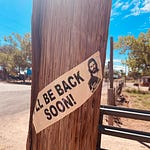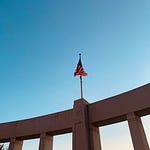Editor’s Note: originally published on Lydwine in the fall, an earlier version of this post was accidentally deleted whilst troubleshooting some technical issues on the site. Reposting today, Inauguration Day, with additional commentary, for obvious reasons…
In both Scripture and legend, the first musicians are remembered as the grandchildren of Cain, cast out from Adam’s more righteous descendants onto a dry and disused plain beyond the foothills of Paradise. Exiled among the devils of an earthen waste, given over to every manner of fornication, they fashioned harps and pipes, rattles and drums, and so with song and tumult lured their cousins — the children of Seth — from high places of worship down into depravity.
Yet still: Jehoshaphat placed singers at the head of his army, David danced before the ark, and John the Revelator offered firsthand reports of songs sung at the foot of the heavenly throne. Music is ambiguous and strange. Necessary perhaps, but powerful, almost too powerful for mankind to endure, as even our own recent history suggests — a succession of American generations somehow undone by the glamour of songs.
It calls to mind that enigmatic remark by the Scottish patriot Andrew Fletcher, that “if a man were permitted to make all the ballads, he need not care who should make the laws of a nation.”
Which is to say, if music helped get us into this mess, shouldn’t it stand to reason we’ll need music to get us back out? And if so, how best might we steward our cultural patrimony, that prodigal’s inheritance of Cosmic American song?
In The American Songbag, Carl Sandburg’s peripatetic account of our nation’s folk tradition, first published in 1927, the poet wrote:
“Some of our songs are sublime; some are silly. Some tell of lovable eyes and hearts, others tell of crimes learned of in grand opera or read about in daily newspapers or in the classics of literature. They deal with a panorama of events and people, substance and shadow, paunches and fleshpots, as well as filaments of sunset mist. They have roles.
“Often a song is a role. The singer acts a part. He or she is a story-teller of a piece of action. Characters or atmosphere are to be delivered… No two artists deliver a role in the same way. Yet all good artists study a song and live with it before performing it… There is something authentic about any person’s way of giving a song which has been known, lived with and loved, for many years, by the singer…”
Howsoever one might feel about the second inaugural of Donald J. Trump — whether it welcomes in a golden age of American abundance, or the disappearance of the republic beneath a smothering mixture of fascism and kitsch — it does not change the importance of songs and songwriting in the soul of the nation, in articulating who we are as a people, and where we might be travelling next, together.
Which is to say, simply, on this first day of an American era entirely unprecedented and unexpected:
Make American Music Great Again.
Update… per a listener request, posting lyrics below:
Mr. Trump, O Mr. Trump
come on by and show us your smile
an SOB for you and me
a big brawlin’ man
come on home now, Mr. Trump
be it the black man, the white man,
the yellow or the red,
America the beautiful
is gone to his head
future’s so bright
circle ‘round to cut him down
still he stand to fight
he’s Mr. Trump, O Mr. Trump
come on by and show us your smile
an SOB for you and me, a big boss man
come on home now, Mr. Trump
sometimes
sometimes
sometimes
you got to be strong
for you and me to get to we
we got to get it on
so take us home now, Mr. Trump
Mr. Trump, O Mr. Trump
come on by and show us your smile
don’t take no bullet in the ear to hear
America crying
come on home now, Mr. Trump
Mr. Trump, Mr. Trump
you got a spirit alright
i hope that he remember we
in the mansion this time
so come on home now, Mr. Trump
so come on home now, Mr. Trump
so come on home now, Mr. Trump
Brian Kennedy is the founder of Lydwine, as well as the frontman and principal songwriter of the arthouse country band The Cimarron Kings. He lives with his wife and six children in Guthrie, Oklahoma.










Share this post